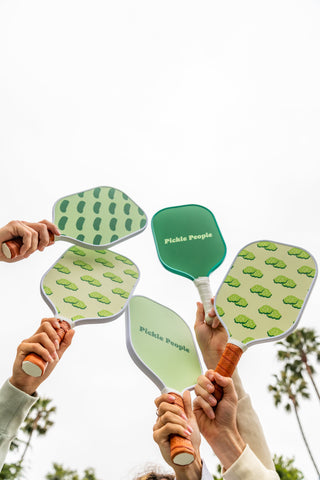The Surprisingly Delightful History of America’s Fastest-Growing Sport
At Pickle People, we believe great things happen when community, creativity, and just the right amount of chaos come together — and honestly, that’s exactly how pickleball was born.
So where did the sport come from? When did people start playing it? And what’s the deal with that name?
Pull up a chair, pour yourself a pickle juice martini (or don’t, we’re not judging), and let’s take a quick trip through the surprisingly charming history of a game that’s now bringing together grandkids, grandparents, and everyone in between.

Old pickleball court, via USA Pickleball
The Origin Story: One Lazy Summer Afternoon
The year: 1965
The place: Bainbridge Island, Washington (just off the coast of Seattle)
The vibe: Pure summer boredom
Three dads, Joel Pritchard, Bill Bell, and Barney McCallum, were trying to entertain their families one afternoon. They had a badminton court, but no shuttlecock.
So they improvised.
They lowered the net, grabbed some ping-pong paddles, borrowed a wiffle ball, and started batting it around. It was weird, scrappy, and ridiculously fun.
Neighbors joined. Then friends of neighbors. And soon, a one-off backyard experiment turned into a sport, one that would go on to sweep the nation.
 Joel Pritchard playing at Bainbridge Island, WA. Via Pickleball Hall of Fame.
Joel Pritchard playing at Bainbridge Island, WA. Via Pickleball Hall of Fame.
Why Is It Called Pickleball?
There are two origin stories. One is elegant. The other has a dog.
The Rowing Theory
Joan Pritchard (Joel’s wife) said the game reminded her of a “pickle boat” — a term from rowing where leftover rowers are thrown together into one boat. Since the game itself was stitched together from other sports, it seemed fitting.
The Dog Theory (Our Favorite)
The family had a dog named Pickles who loved chasing the ball and running off with it mid-play. So naturally, the game became Pickle’s ball, and the name stuck.
We’ll let you decide which version you prefer. Around here, we give Pickles full credit. He was clearly the original MVP.

Friend of Joel Pritchard playing at his home in Bainbridge. Via J. Pritchard.
From Backyards to Big Leagues: A Pickleball Timeline
1972 — The First Official Court
Barney McCallum builds a permanent pickleball court in his backyard.
The sport goes from “let’s wing it” to “let’s build it.”
1984 — The USAPA Is Formed
The USA Pickleball Association is born, along with the first official rulebook.
Spoiler: the kitchen rule still applies.
1990 — All 50 States Catch On
Pickleball spreads coast to coast, becoming a rec center favorite, especially among older adults.
The competition heats up, and the shorts get shorter.
2005 — The First National Tournament
Held in Arizona, this event brings together top-tier players, big dreams, and some very intense dinks.
2010s — The Boom Years
Courts pop up everywhere: parks, churches, gyms, driveways.
Pickleball is no longer a niche, it’s a movement.
2020 — Pandemic Surge
With indoor gyms closed, people take to the courts in record numbers.
Socially distant? Yes. Socially awesome? Also yes.
2022–2024 — The Pro Era
TV broadcasts. Major League Pickleball. Celebs with paddles.
The sport goes mainstream, without losing its weird charm.
Today: The Pickle People Era
Pickleball is now the fastest-growing sport in the U.S., with over 20 million players and a culture that’s part competition, part comedy, and all community.
At Pickle People, we’re proud to be part of the story, creating high-quality gear for all ages, all abilities, and all kinds of fun.

Final Dink: Why Pickleball Still Feels Like a Backyard Game
Despite the pro leagues and prime-time tournaments, pickleball still holds onto what made it special from the start:
It’s quirky. It’s accessible. It’s social. It’s fun.
And whether you’re seven or seventy, there’s a place for you on the court.
So the next time someone asks, “Where did pickleball come from?”
Just smile and say:
“A couple of bored dads, a wiffle ball, and a dog named Pickles.”
Ready to Play?
Find your paddle, rally your crew, and bring your best serve (and your best jokes).
Because in this game, age is an advantage, and fun is always in play.




